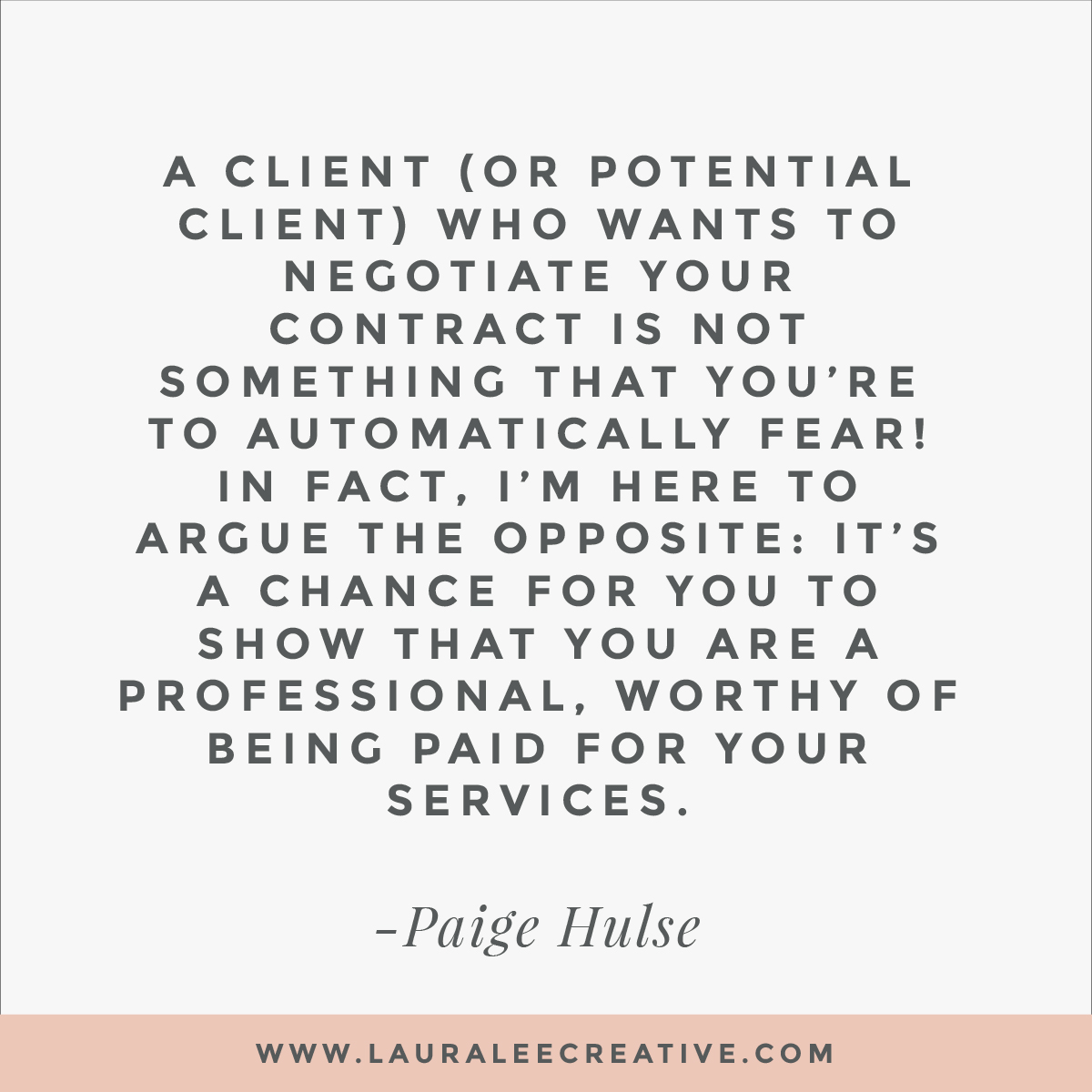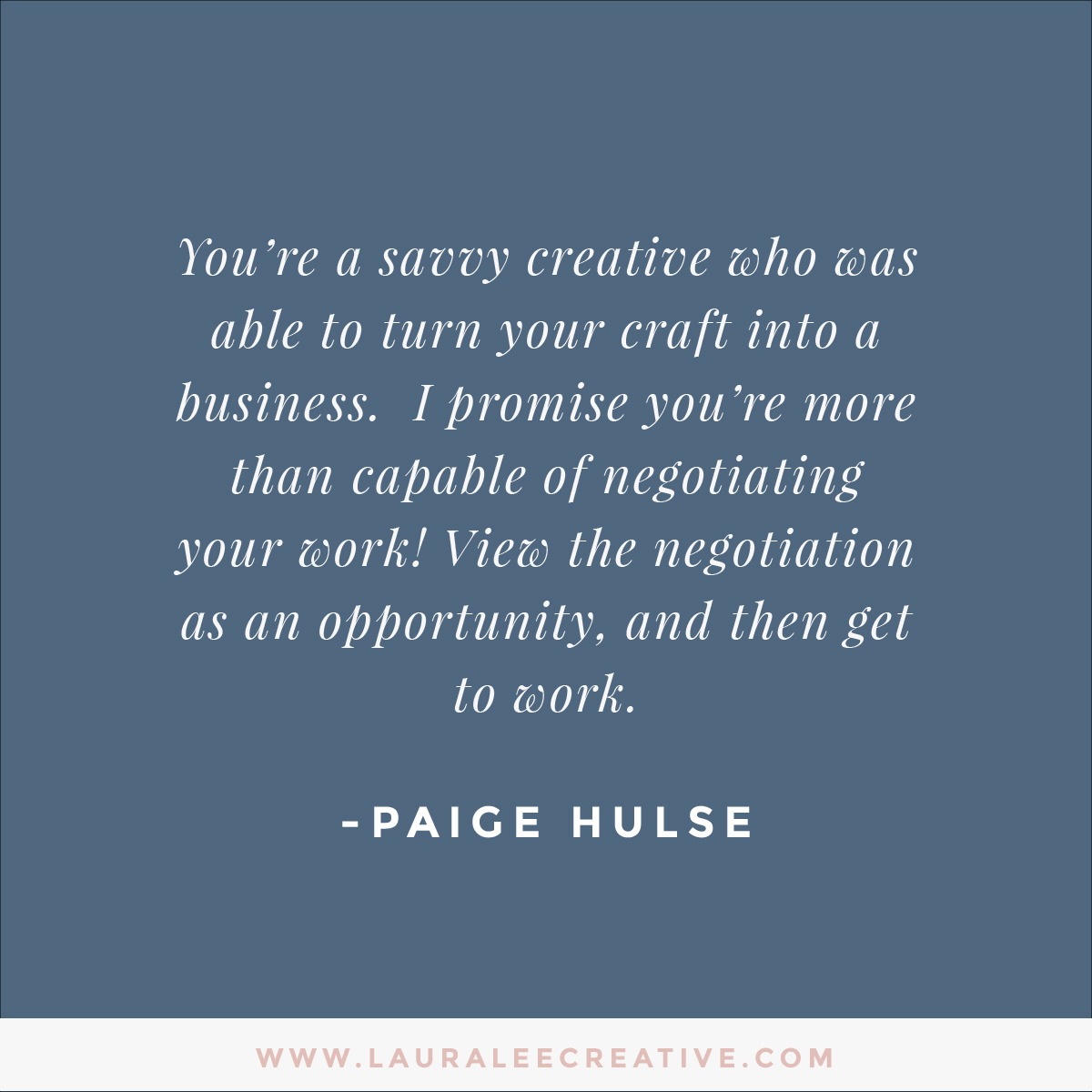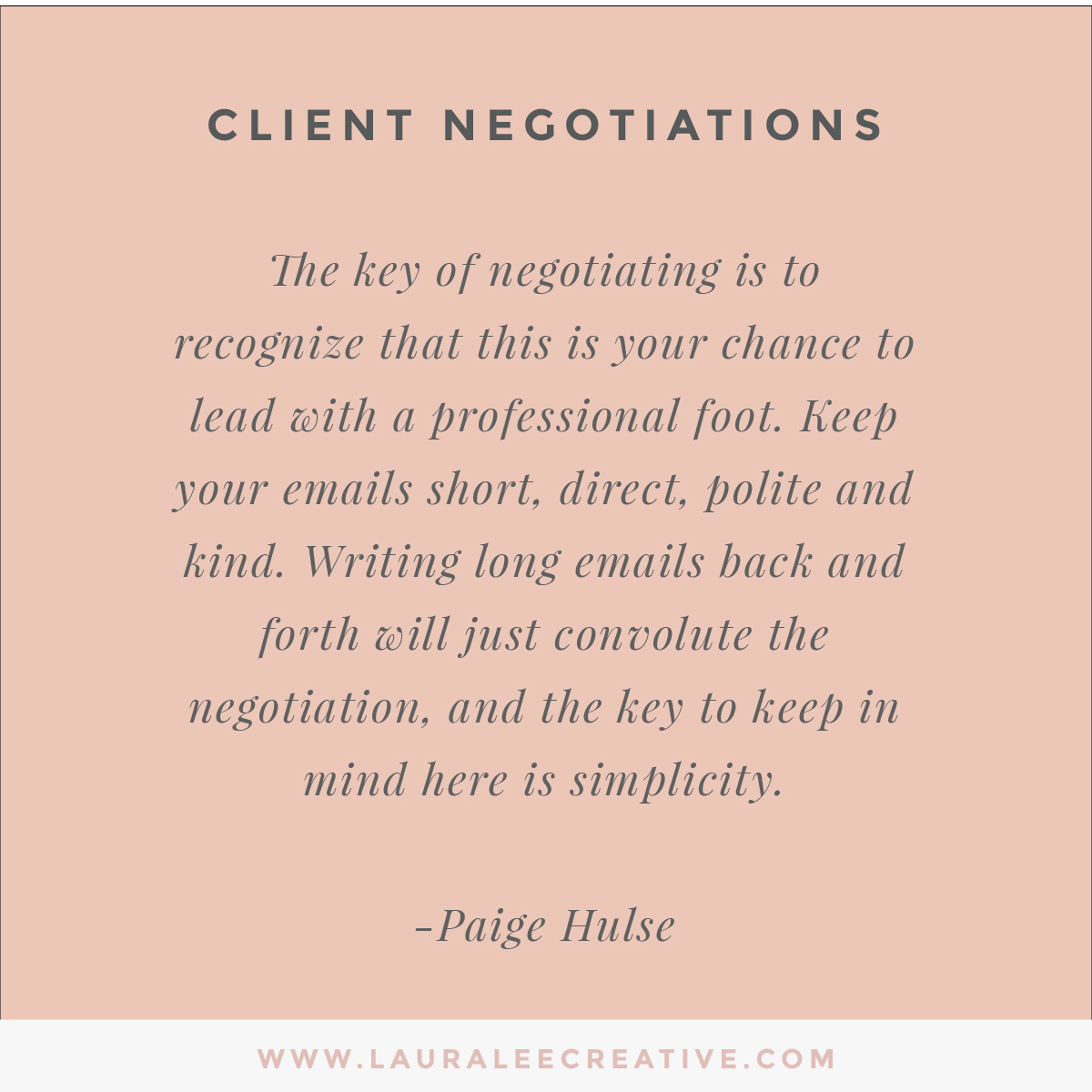{We’re so excited to welcome Paige Hulse of The Creative Law Shop to be our guest on the blog today! You guys are going to love her and everything she can do for your business. Today, she’s talking to us about Client Negotiations and it’s good! Grab a cup of coffee or tea and meet Paige!}
We all started because we have a talent that led us into business, right? For me, it all began when a search for a creative outlet led me to pick up a calligraphy pen one day… and then, people started paying me for my hobby.
There’s not much better than that, right? Getting paid to do what you love anyways? I’m convinced there aren’t many business opportunities better than that… until you’re faced with the client who wants to negotiate your services, and then everything suddenly becomes much more complicated. Just because we love what we do doesn’t necessarily mean we’re prepared for negotiations, right?
However, I’m here today to tell you that a client (or potential client) who wants to negotiate your contract is not something that you’re to automatically fear! In fact, I’m here to argue the opposite: it’s a chance for you to show that you are a professional, worthy of being paid for your services.

I know that may sound like a lawyer’s idyllic viewpoint on the subject, so let me share a true story of one of my clients just a few months ago. Between Christmas and New Years (i.e., engagement season), my client was approached by a potential new client who wanted to book her for a summertime wedding at the largest, most elite venue in our city. My client sent over the contract, and low and behold…the contract came back covered in red ink, signed by the bride to be’s (attorney) father of the bride. Go figure.
Now, my client was initially annoyed. After all, wedding photography contracts don’t need to be treated like multi-million dollar business negotiations, right? And I had drafted this contract for her-after working as a contract attorney for publicly-traded corporations, I can tell you that it was a sound document to begin with. However, we took a look at his changes and realized that for the most part, those “changes” were merely semantics. It’s an old lawyer’s trick; create the illusion of a weak document starting out, so that you gain leverage in the negotiation.
My client and I assessed which changes were just that; semantics; and which warranted closer scrutiny, such as ownership of the images and cancellation provisions. Luckily, my client had taken the time to educate herself on her contract prior to sending it out into the world, so she knew what she was willing to negotiate on, and what was a non-negotiable. She sent a polite but firm email back, accepting and rejecting various suggestions.
In the end, negotiations were successful and the couple ended up booking my client. Not only did they book, but the father of the bride sent her a note back with the signed contract, stating that out of the 4 total photographers they had spoken to, they booked my client purely because her contract was impressively professional, and they appreciated that she was willing to negotiate the contract. They felt heard, and safe in the relationship.
Now, this story with my client is not uncommon- especially in the wedding industry, where so many wedding professionals are asking clients to pay large sums of money for something they’ve never done before. For example, photographers, how many of your clients do you think have actually paid thousands of dollars for photography before? That can be an intimidating moment, and rightly so! For that reason, I tell my clients that it’s crucial for them to educate themselves on the art of negotiation: not something to fear, but a tool to have in their toolbox. A way to make your clients feel heard, known, and respected, all while showing that you’re a professional.
So, what do you do when a client wants to negotiate a contract?
My client’s story is great and all, but what do you actually do when a client approaches you, asking to negotiate?
The first thing I tell all of my clients sounds simple, but is the most important: shift your perspective. The invitation to negotiate is an invitation by your potential client to show off the fact that you’re a professional. You’re a savvy creative who was able to turn your craft into a business: I promise you’re more than capable of negotiating your work! View the negotiation as an opportunity, and then get to work.

On a practical level, I want you to start with your contract. (Just a note, if you’re not using a contract, you have no leg to stand on-you must start now). You need to know where you’re starting from. Is your contract a document that will actually hold up? Just jotting down some terms and signing your names doesn’t necessarily mean it is- if your contract could actually be held up in court, then it actually must be equal to both parties. Not necessarily split 50/50, but generally speaking, equal. If it favors one party too much, a judge would throw it out. As such, it’s important that you tell that to your potential client- this will set the stage for a calm, professional negotiation. In my experience, starting with this fact automatically puts both parties at ease.
Next, I want you to be completely knowledgeable as to what each paragraph of your contract means. Know why the provisions are in there, and be prepared and able to walk your client through each provision. Of course, if you have a contract drafted by an attorney, then you know each line is there for a reason. This is exactly why I record video tutorials for every contract template I sell-so that the user of the contract has the chance to understand everything in their template, and can keep it on hand for future client conversations.
No matter what contract you use, it’s essential that you understand every paragraph of the agreement. If your client is concerned about a specific portion of the contract, be prepared to talk to them about why it’s included!
Second, take the time to consider where your client is coming from. This ties in closely with what I just described above, but recognize that your client is probably in largely uncharted territory themselves. Many times (I’d argue, the majority of the times) when they act like they want to negotiate, they are really just seeking clarification.
I see this come up most frequently with the copyright provisions in wedding photography contracts- in fact, this was the area that required the most negotiation in my client’s story above. Most clients have no idea why you want to “own” the photos you take of them (are you going to use them again, or something?!), while all photographers are intimately aware of why they must protect their intellectual property ownership of their work. If you explain to your clients why that provision they don’t understand is important, they’ll probably see the issue from a different perspective than they ever have before.
Third, I want you to define your non-negotiables. I touched on this briefly already, but take a good look at your non-negotiables. Provisions like your intellectual property, your cancellation policy, your deposit or retainer provisions are most often non-negotiables. On the other hand, provisions like your exclusivity or travel provisions, or even your payment timeline might be something you’re willing to negotiate on. Defining non-negotiables will largely be a business decision that only you will be able to make. Most of the time, you can negotiate with more than just money, and making concessions in one area will help you preserve those non-negotiables.
A quick note on what isn’t negotiable, under any circumstances: a client who wants to negotiate after they’ve already signed the contract. Modifying or amending contracts falls into an entirely different, murky area of contract law, so tell your clients that it’s simply not possible to sign the contract, then go back and try to negotiate something like price later on. Of course, there are situations wherein you might actually need to enter into a new agreement, and generally speaking if that occurs, you’ll probably want to just enter into a separate agreement.
Keep everything in writing
This is key to your negotiation. Even if you have these discussions in person or over the phone initially, follow up everything in writing. There are many reasons for this that I won’t extrapolate on today, but this will help to minimize potential miscommunications between you and your potential client drastically, and will allow you to have something to fall back on in case the negotiation becomes complicated. If you are making changes to the contract, all proposed changes and negotiations to your contract should be clearly marked. I advise my clients to use a word document with track changes on, so that both parties are able to see exactly what those changes are.
When you communicate with your client, be polite but firm
Again, the key of negotiating is to recognize that this is your chance to lead with a professional foot. Keep your emails short, direct, polite and kind. Writing long emails back and forth will just convolute the negotiation, and the key to keep in mind here is simplicity.

Of course, be careful with what you say- don’t make promises that you can’t keep. The initial email of the negotiation will be the trickiest- you will have to toe the line between being kind and professional.
There you have it! While it may seem temporarily nerve-wracking when a client wants to negotiate your contract, by taking a step back and keeping these points in mind, you will be absolutely prepared to negotiate.
The Creative Law Shop | Instagram | Email | Facebook | Pinterest


+ show Comments
- Hide Comments
add a comment